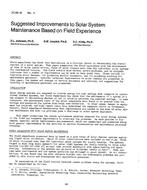The power demand peak caused by compression climatisation may be reduced by using direct-fired sorption chillers. Commercial absorption chillers reach a coefficient of performance (COP) of about 1.2, which often is not high enough to compete with compression chillers. Using high-temperature driving heat, the COP of absorption chillers can be improved by multistaging. But at high temperatures, currently used working pairs tend to cause heavy corrosion of the construction materials. Solid sorption systems as high-temperature topping cycles can avoid these problems. In a French-German cooperation a cascading triple-effect system is being realised consisting of a bottoming double-effect machine working with LiBr/water and a topping solid-reaction machine working with NiCl2/ammonia. A COP of 1.35 is expected in this experiment, equivalent to an improvement of about 13% compared to the industrial standard. The solid-reaction topping cycle can also be realised as a two-reaction system. Then a COP of 1.55 can be expected, which means a 28% improvement. Even quadruple-effect operation is possible with a COP of 1.8. Several possible cycle configurations are discussed. The advantages and problems of the envisaged combined cycles are presented and the principal design of the experiment is outlined.
KEYWORDS: year 1996, chillers, gas, cooling, absorption refrigeration, compression refrigeration, coefficient of performance, comparing, cyclic, experiment, solid, lithium bromide, lithium chloride, water, ammonia, cascade refrigeration, high temperature
Citation: Symposium Papers, Atlanta, GA, 1996
Product Details
- Published:
- 1996
- File Size:
- 1 file , 690 KB
- Product Code(s):
- D-17199


